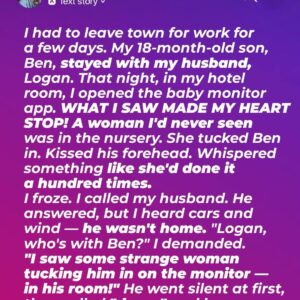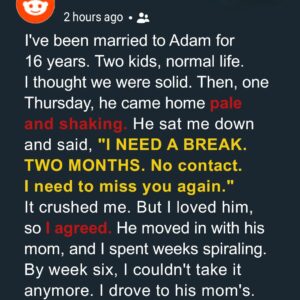
Long evenings and short tips were normal for Lena. Working the graveyard shift at a 24-hour diner was unglamorous but barely paid the bills. She was too busy with rent, college loans, and her sick mother to do anything else.
He entered near 2 a.m.
He appeared neglected with a shabby clothing, chipped glasses, and a limp. Isolated at the farthest booth, he discreetly scanned the menu with shaky hands.
Lena spoke gently as she approached. “Coffee first?”
He nodded. “Thanks, just water.”
She immediately noticed his constant glances at the pricing, as if calculating how little he could pay without suspicion.
When she returned with water, he whispered, “What’s the cheapest thing on the menu?”
Without hesitation, Lena grinned. Dinner is on me tonight. Order whatever you want.”
The old man froze. “You needn’t.”
“I know,” she said. “I want to.”
The man ordered soup. I barely touched it. He wrote something on a napkin, folded it carefully, and placed it under the empty bowl before leaving.
Lena didn’t immediately look. When she remembered, he was gone.
Thank you, said the napkin. Your understanding will come.”
She assumed he wrote a beautiful note from loneliness.
Until tomorrow.
Two black-suited men entered the diner at midday, inspecting the room with badges.
One asked her directly, “Are you Lena Morales?”
Her heart raced as she nodded.
He handed her a sealed envelope from his coat and said:
Asked us to give you this.”
She regarded the packet as if it would burst. “Who?” she asked.
“The man you served last night,” the taller agent remarked, impassively. “He was Armand Castillo.”
Lena trembled when she received the envelope, not knowing the name. She hid in the alley behind the diner and ripped the seal after her shift ended.
A handwritten, wobbly, clear note was inside:
Dear Lena,
You showed me kindness. Over the past twenty years, I’ve searched for someone who will see me for who I am, regardless of my finances.
Passed test.
I founded a tech company and was CEO. Rich, retired, and bored of superficial caring. I vanished. I changed my name, dressed down, and wandered. In all my travels, only you have shown courtesy without expecting anything in return.
I’ve told my lawyers to look after you. Your trust fund exists. Not charity. Gratitude.
Check your account tomorrow.
—Armand”
Dry mouth, Lena. She suspected a joke. Some elaborate joke. The next morning, her bank app showed a new account with her name and $157,000.
She dropped her phone.
Her initial reaction was disbelief. Guilt follows. Then relief. She could finally care for her mom with that money. She could exit the diner. Maybe return to school full-time.
She didn’t spend it immediately away.
Instead, she took her mother to the hospital for adequate care. Early intervention could extend her good years, they suggested. She didn’t blink at the expensive treatments. First time in years, she didn’t.
She paid off the outstanding rent and put her mom into a modest apartment near a care center.
She felt like she was dreaming for weeks.
The twist followed.
While sorting her mom’s meds at the pharmacy one afternoon, she heard her name.
“Lena?”
She noticed a well-dressed, pallid, fifty-year-old woman with tired eyes.
“Do I know you?” Lena asks.
The woman appeared tearful. I’m sorry to bother you. Hi, Maria Castillo. My father was Armand.”
Lena’s heart raced. “I didn’t know he had family…”
“Most people didn’t,” Maria remarked. We were far. He checked out after my mother’s death. He gave away money strangely. Gone from our life. I just learned about you when the lawyer called.”
I didn’t mean— Maria raised her hand as Lena began.
“I don’t blame you. I come to thank you.”
Lena blinks. “What?”
“My dad never trusted others. However, he always said he would know if he found someone decent. He preferred to be viewed as a man, not a bank. You gave him. “I hated his disappearance, but knowing someone showed him kindness when he was in need means so much.”
The two women chatted outside the pharmacy for over an hour. Maria told stories of Armand before the money and company, when he was a dad building a life. Lena offered anything she knew about him—soup, napkin, quiet.
Maria called again a week later.
“My father left me nothing,” she remarked. “That hurt. But after meeting you… That could be his way of asking me to start afresh. He wants me to recognize what matters.”
Maria offered to help Lena’s mom into a better care facility her family knew.
Despite not being friends, something had changed. Two women seeking to make sense of a wealthy man’s will were not resentful daughters and waitresses.
Months passed.
Lena didn’t leave the diner immediately. Instead of necessity, she worked part-time because she liked it. She appreciated the pace, people, and being a small light in someone’s dark night. In order to help others like her mother, she returned to nursing school.
Another stranger—a teenage lad with a ripped jacket and sunken eyes—arrived one cold November night. He shared Armand’s booth.
He got coffee from Lena. He struggled with his wallet, and she grinned.
“Dinner’s on me tonight,” she said.
The boy paused. “Why?”
She considered Armand. Of Maria. Her mom now smiled more often.
She answered, “Because someone once did the same for me.” “And it changed everything.”
The kid nodded slowly, and Lena felt calm.
Money wasn’t involved. It never was.
This was about kindness. How one tiny gesture, like seeing someone instead of passing them by, may change lives like sunlight on water.
A will didn’t end Armand’s story. It started with soup.
And Lena? Not simply a waitress. She showed goodness still mattered. You might get the most unexpected benefits when you have nothing left to give.
Next time you see someone hurting, remember that your simple act of kindness could change their life.
Please like and share if this story moved you. Someone may need to read this today.





